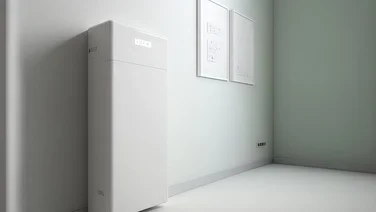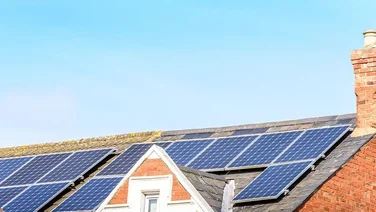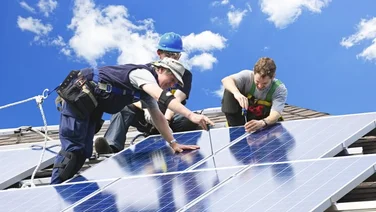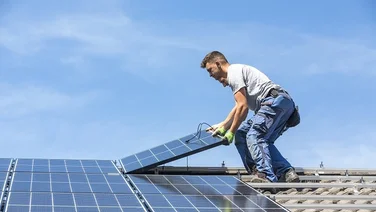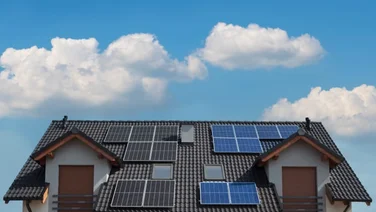We receive a small fee from trusted installers when you request a quote through our site. This helps us keep our content independent, well-researched and up to date – Learn more
- Solar battery cost calculator
- How much does a solar storage battery cost in 2025?
- What's the VAT on solar storage batteries?
- Why did the UK government cut VAT on solar panels?
- How does the UK’s solar VAT rate compare with the rest of Europe?
- Solar battery price guide: Cost by capacity
- What size battery do I need for my solar panels?
- What other factors affect battery cost?
- Is a solar storage battery worth buying?
- Battery safety regulations and requirements
- Next steps
- A solar storage battery for a typical house costs around £5,000
- A battery lets you use much more of the electricity your solar panels produce
- Adding a battery can cut your electricity bill by 90%

The average solar storage battery for a UK home costs around £5,000, with prices ranging from less than £2,000 to over £11,000. A battery is a worthwhile investment because it allows you to use much more of the electricity your solar panels produce.
According to Octopus Energy, adding a battery to your solar PV system can cut your electricity bill by 90%.
The best solar storage batteries also let you store electricity from other sources, such as from the grid during off-peak hours.
But while a solar battery can save you a fortune in electric bills, it is a chunky upfront investment. The average price of a battery for a UK home is £5,000.
Prices vary according to factors including a battery’s capacity, lifespan and brand name. You can also cut the cost of solar panels and a battery by having them installed at the same time. Read on for the full lowdown on costs and savings.
Solar battery cost calculator
The bigger your house and the higher your electricity costs, the larger your solar battery will need to be – and the more you’ll need to pay for it.
Here’s a quick cost calculator to help you plan:
How much does a solar storage battery cost in 2025?
“If you’re looking for a battery with a medium capacity of 5 kWh (kilowatt-hour), which is ideal for a three-bedroom house, expect to pay around £5,000. Prices for solar storage batteries range from around £2,500 to over £11,000.
Capacity is the main factor that dictates how much a storage battery costs. It works out at around £265 to £415 per kWh of storage.
The more solar panels you have, and the higher your energy usage, the larger your battery’s capacity will need to be.
Many of the best solar batteries are modular or stackable, which means you can add extra units to increase the system’s overall capacity. This allows you to start small, then scale your storage system as your solar output or energy needs grow.
What’s the VAT on solar storage batteries?
There has been 0% VAT on solar storage batteries, since February 2024, regardless of whether they are a standalone product or part of a solar panel system.
This has helped bring down the price of solar storage batteries. Cutting VAT to 0% could potentially make prices as much as 20% lower than they were before, but with rising inflation this is not guaranteed as installers can raise their prices.
Why did the UK government cut VAT on solar panels?
The UK government cut VAT on a number of energy-saving products, including solar panels, to encourage more homeowners to install them by making them cheaper.
The government also aimed to improve the energy efficiency of UK homes, often citing the need to help with the cost of living crisis, which solar panels can help address.
Encouraging more homes to invest in renewable energy, such as solar, will also support the UK government’s pledge to reach net zero by 2050. More homes using renewable energy, means fewer carbon emissions.
Want to find out more about how renewable tech can cut your energy bills? Read our page on how an eco-home can save you money.
How does the UK’s solar VAT rate compare with the rest of Europe?
The European Union (EU) also updated its VAT regulations in April 2022, and now allows its member states to cut VAT on solar panels, and reduce VAT to as low as 5% on other energy-saving products, such as heat pumps. Since then, a few EU countries have taken advantage of the new regulations.
For example, in Germany, there has been no VAT on solar panels or solar batteries – including both materials and installation – since January 2023.
Belgium reduced VAT on solar panel systems to 6%, between April 2022 and December 2023, but it has now gone back up to 21%.
In most European countries, you still have to pay some VAT on solar panels – unlike in the UK. But with the EU also aiming to reach net zero emissions by 2050, more EU members could follow suit, and reduce or cut VAT on solar panels in the future.
For example, Austria just recently reduced VAT to 0% on residential solar panel installations in January 2024.
Which solar products are you interested in?
Get startedSolar battery price guide: Cost by capacity
Expect to pay around £1,000 per kWh of capacity up to around 5 kWh, then a little less per additional kWh.
Here’s our estimate of current battery prices for a UK home:
| Battery capacity | Average battery price |
|---|---|
| 4 kWh | £3,000 – 4,000 |
| 5 kWh | £4,000 – £5,000 |
| 10 kWh | £8,500 – £10,000 |
| 12 kWh | £10,800 – £12,000 |
| 16 kWh | £12,000 – £16,000 |
These prices cover the battery modules, inverter, VAT and installation.
Note that a battery’s headline capacity is usually not always the same as its “usable capacity”. This is the amount of stored energy you can actually use, minus the small amount (5-10%) required by the battery for charging and discharging.
What size battery do I need for my solar panels?
The size (capacity) of solar storage battery you need depends on how much electricity your solar panels produce, and how much energy you use.
As a rule of thumb, your battery should be able to store about double the daily electricity output of your solar panels.
Your solar panel installer will help you choose the right battery for your PV system. Here’s a rough guide to the size of battery you may need:
| Solar PV system size | Number of 350W panels | Approx house size | Recommended battery |
|---|---|---|---|
| 2 kWp | 6 | 1-2 bedroom | 4 kWh |
| 3-4 kWp | 10 | 3 bedroom | 7 kWh |
| 5 kWp | 14 | 4 bedroom | 10 kWh |
| 6 kWp | 17 | 5+ bedroom | 12 kWh |
A high capacity battery may be useful for future-proofing your renewable energy system. If you plan to add an EV charger or heat pump at some point, a larger battery will allow your system to meet higher evening loads without the need to add more solar panels.
However, don’t be tempted to buy a bigger battery than you need – because your panels won’t be able to recharge it.
If a battery can’t fully empty and recharge regularly, it won’t perform as well as it should.
What other factors affect battery cost?
Size isn’t everything when it comes to solar batteries. Here are some other factors to bear in mind when shopping around for your ideal battery:
Battery type
There are two main types of battery: lithium-ion and lead-acid.
Most modern storage batteries are lithium-ion. They are slightly more expensive to buy than lead-acid batteries, but they’re better performers and have a longer lifespan.
Lead-acid batteries have a cheaper upfront cost but don’t perform as well, especially over time. They may end up costing you more in the long run because they’re more likely to need replacing.
Here’s a quick comparison:
| Features | Lead-acid battery | Lithium-ion battery |
|---|---|---|
| Capacity | 4 kWh (example) | 4 kWh (example) |
| Average price | £2,000 | £4,000 |
| Average depth of discharge | 50% | 90% |
| Average cycles | 1,800 | 4,000 |
| Cost per kWh, per cycle | 56p | 28p |
Lifespan (cycles)
The table above mentions the number of “cycles” a 4 kWh lithium-ion and lead-acid battery will achieve in its lifetime, on average. One cycle means one full charge and discharge of the battery.
More cycles generally means a longer lifespan. The more times a battery can empty and recharge, the healthier it is and the more years you can expect it to last.
Batteries with more guaranteed cycles tend to cost more than batteries with fewer cycles. However, it’s not an exact science. One of our best solar storage batteries, the Alpha Smile5 ESS 10.1, boasts a higher-than-average 10,000 expected cycles but offers superb value for money at around £4,000 for a usable capacity of 9.1 kWh.

Depth of discharge (DoD)
This refers to the amount of electricity you can extract from a battery before it needs recharging. It’s similar to usable capacity, but not quite the same.
It’s rare for a solar storage battery to have a DoD of 100%. Most batteries can be drained about 90% before they need recharging.
This is a common principle with rechargeable batteries, including the ones in your phone and laptop.
That said, some of the best batteries do have a DoD of 100%. Examples include the new Enphase IQ Battery 5P, which can be completely drained of its 5 kWh capacity before it needs recharging.
Warranty
Solar batteries typically come with a 10-year warranty.
That’s less than half the typical 25-year warranty period for a solar PV system, so be aware that you may need to replace your storage battery long before you replace your panels.
Occasionally a battery will come with a longer warranty – and that doesn’t always make it especially expensive. The Moixa Smart Battery, another of our best solar batteries, costs a good-value £4,500 for a 4.8 kWh model and comes with an unlimited warranty if you join Moixa’s Gridshare Cashback Scheme.
Scalability
Stackable and modular battery systems let you scale your battery capacity as needed. This means you can start with a smaller battery and add more units later.
The modular option normally adds a bit to the price of a battery, but not always. The stackable Huawei Luna 2000-10 is excellent value, costing around £3,500 per 5 kWh unit. You can connect as many as six units to create a whopping total capacity of 30 kWh.
Smart features
The more expensive solar batteries normally include “smart charge” functions, which mean they automatically calculate their charging patterns according to factors such as your energy usage.
You can manage your battery’s smart functions and track various metrics via a mobile app.
Many premium batteries also offer automatic power cut support. They instantly provide you with emergency power without feeding any current back into the grid – to spare the safety of any poor engineers working to restore power.
Installation
Solar storage batteries must be installed by qualified professionals, so that’s another cost to take into account. Large, premium batteries may cost more to install than smaller, cheaper ones.
Installation costs also vary based on based on the size of battery you need, your location and the layout of your property. You can normally knock a bit of money off by combining solar panel and battery installation.
Is a solar storage battery worth buying?
A storage battery cuts your energy bills, shrinks your carbon footprint and can even keep your home running in a power cut. But it costs thousands to buy and install, and may not break even for decades – if ever.
The pros, cons and costs aren’t the same for everyone. Here’s a quick summary:
Long term benefits
- A solar battery system helps to protect you from energy price rises, since it means nearly all your electricity will come from solar.
- A three-bedroom property with a solar panel system and a 5kWh battery such as the Enphase Encharge IQ Battery 5Pwill save nearly £600 per year through reduced electricity bills.
- A solar battery is one of the best ways to reduce your carbon footprint. Over its 25-30 year lifetime, a standard solar and battery system can prevent 33-44 tonnes of greenhouse gas emissions from entering the atmosphere.
- Many batteries can automatically keep your home powered during a power cut. If you work from home, it could protect your livelihood!

Short term costs
- The average solar panel system costs more than £7,000. A further £5,000 for a battery is a huge chunk of money to find.
- It takes longer to break even on a solar-plus-battery system than on solar panels alone: around 26 years compared to 15.66 years without a battery.
- The additional savings on your electricity bills from adding a battery are unlikely to outweigh the cost of the battery, since batteries only last 10-15 years.
- A storage battery takes up roughly the same amount of space as a washing machine or combi gas boiler.
- If you already have solar panels, you may have to buy an additional inverter if you want an AC (alternating current) battery. An inverter typically costs £800.
- There’s arguably little point in buying a storage battery if you have an EV (electric vehicle). Instead of storing the excess energy from your panels, you could just use it to charge your car.
Find more info about the costs and benefits of batteries in our article asking whether solar batteries are worth buying in the UK.
How big is your solar panel system, and how roughly much did it cost?
“We had a combined package of solar panels and solar batteries, with a capacity of 13.8 kilowatts (kW). The total cost was £14,500. The panels were about £5,000.”
Do your solar panels generate enough power to cover all your electricity needs?
“In June, which was sunny, we used solar for almost all our electricity needs, including the car and hot water. In July and August, we had to use some grid power overnight to charge the batteries because the weather wasn’t so good.”
Have you managed to break even on your solar panels?
“We won’t break even for a few years yet, but feel we have pre-bought our energy and are protected from the vagaries of the energy market.”TT
Kassy lives in North Yorkshire, and has owned solar panels and solar batteries since February 2023.
Battery safety regulations and requirements
New UK guidance means new requirements as to where solar batteries can be placed, and who by. They are required to be installed by MCS-certified installers and although the outdoors is preferred, for those looking to install a battery inside, it cannot be placed in a loft, sleeping areas, or block access to escape routes.
Any other location must be well-ventilated and keep away from direct sunlight.
Alongside broader health and safety regulations, the systems must meet fire safety goals and have smoke/temperature sensors.
Next steps
By now, you’ve made up your mind whether or not to include a solar battery with your solar PV system.
If you don’t already have panels, the next step is to compare quotes for panels alone or panels with a battery.
Pop a few details into this free form, and we’ll ask a hand-picked selection of installers to get in touch with a tailored quote.
Which solar products are you interested in?
Get started


